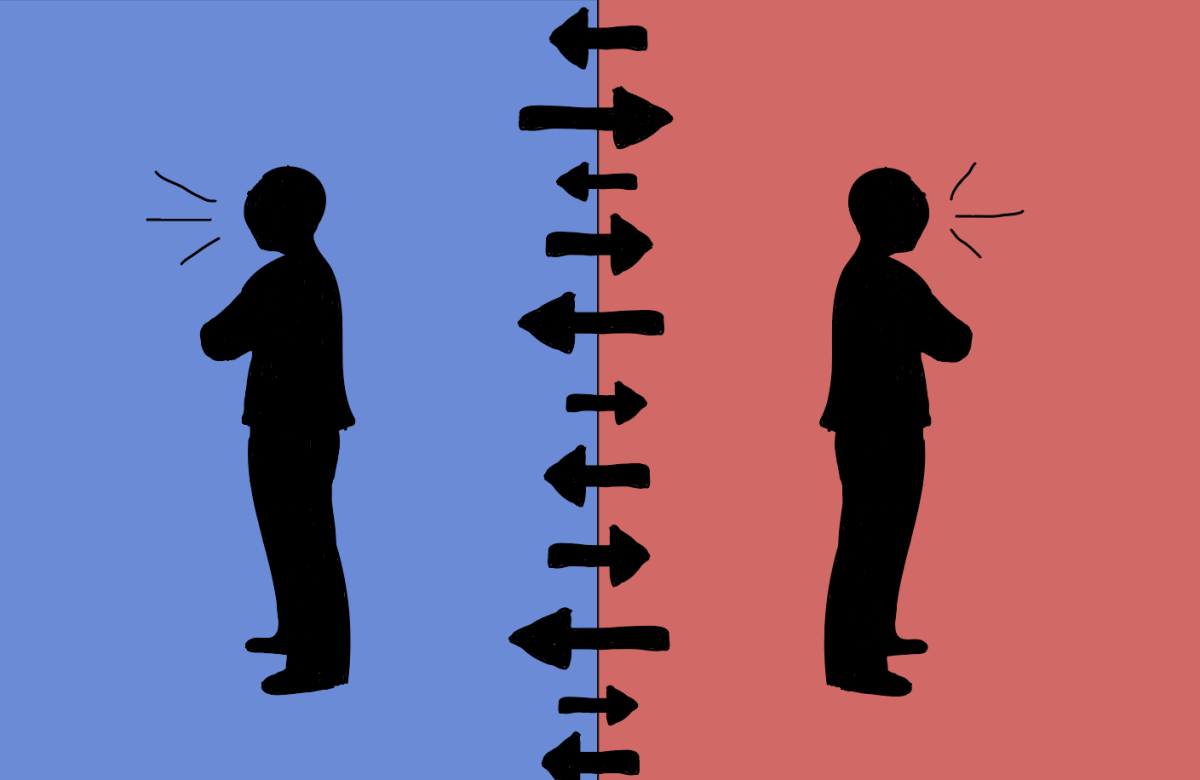Picture this: a massive game of tug-of-war between two political parties. On one side, we have the liberal left; on the other, the conservative right. They each grab an end of the rope and begin pulling. In the center of that rope is a knot.
Each side thinks if they can just pull hard enough, if they can just get as far away from the other side as possible, then they will win and consequently undo the knot. However, as each side begins pulling harder and harder, their goal becomes self-defeating. The knot gets tighter and smaller, harder to see and impossible to untangle.
Instead of closing the gap of political divide, we are widening it. In doing so, we are tearing apart communities and families and seeing a gradual breakdown of American values. Each side thinks that they are fighting for the greater good, but their sense of moral righteousness is causing them to drown in blatant ignorance that is detrimental to American society as a whole.
In the last eight years, our country has become an intellectual dystopia. Americans on the left and right refuse to engage in fruitful conversations, exchange ideas and thoughtfully problem-solve. We are living in a world in which friendships and even familial bonds are broken over a difference in political values. Stereotypes and biases are running rampant throughout our communities. America has dropped from 15th to 23rd in the international ranking of well-being. The American people are hurting and suffering, and the widening political gap is creating a rather bleak outlook for our future.
Now, with the 2024 election coming up, we are seeing two of the most politically polarized candidates in American history. We as a collective must come together to reevaluate our shared values and goals and ponder how we can close the knowledge gap that is preventing us from solving many complicated, multifaceted issues that are plaguing our nation.
When I take a step back and look at our divided country, I most often see two sides with valid viewpoints who are refusing to speak to one another. They often fail to get to the heart of the problem, in which lies a potential solution. Of course, reaching the heart means cooperation and compromise between the two. Is this even possible in the current state of our nation? What does it look like? And most importantly, what will happen if we don’t bridge the gap and end this obnoxious game of tug-of-war?
“US VS. THEM”: THE MOB MENTALITY & SOCIAL MEDIA
The mob mentality has been a defining feature in the public eye, especially since the COVID-19 pandemic. I continuously see statements on social media telling me that if I’m not posting about a particular political issue, then I’m a part of the problem.
This seems like a two-way street, however, as it implies that if I am posting about a given issue on social media, then I’m doing something to help the problem. However, neither of these is true, and this mindset is a byproduct of the toxic mob mentality that is rampant throughout online culture.
When we post our political opinions on social media, it sends a message of ignorance to the fact that your followers are likely politically diverse, and hostility towards any that don’t align with your ideals. It does not open up conversations; it shuts them down. And most importantly, it mounts up pressure on viewers to want to conform. The message it sends is: “If you want me to be your friend, you have to think like this.” And as natural social creatures, we are inclined to feel guilt and pressure to conform so that we can be liked. But should friendships depend on ideological conformity?
The reality is that social media is not the best avenue for political discourse. Though people claim that by posting this content they are raising awareness, the negative effects are ultimately outweighing the good. It’s harming people’s capacity to think freely and explore ideas on their own. It’s also causing us to survive on a constant need to surround ourselves with a circle of validation. Rather than exposing ourselves to a wide variety of ideas and solutions that could enrich our understanding of how to solve a problem, we are limiting ourselves to a very specific group of people who agree with everything we say.
I once overheard someone say in a conversation: “Don’t tell me you’re one of those pro-lifers!” This is exactly the type of divisive language contributing to our political separation and hindering fruitful conversation. It’s stigmatizing and hostile and dances on the fine line of bullying. It immediately shuts the person out and conveys the message that they don’t believe anything positive or enriching could possibly come out of a dialogue with them.
The mob mentality is inherently anti-American. It creates the notion of “Us vs. Them”, stigmatizing the “other” as someone evil and cruel, completely disregarding the notion of fruitful communication whatsoever. It is broadening the gap between American citizens, a complete juxtaposition to democracy. The underlying value of democracy is a voice for all, and the mob mentality silences the voices of many.
WHAT DOES POLITICAL POLARIZATION LOOK LIKE?
Political polarization happens on national, communal, familial and relational levels. As a Christian, I find that people will very quickly stereotype me solely based on my religion. They assume, simply because I believe in Christ, that I must adhere to a very specific political agenda. Their rashness in jumping from point A to point C in rationalizing whether or not I align with their values paints a picture of the incredibly narrow-minded thinking driven by political polarization. They label me as hateful, discriminatory and perhaps even anti-intellectual simply because of my religious identification without even bothering to engage in any fruitful conversation with me. In a country that promotes freedom of religion, this relays very backward thinking.
Growing up, I always believed that relationships were based on character, not political opinions. I never minded if my friends had different political opinions, religions, values or otherwise — as long as they treated me and others with dignity and respect. I, of course, would be expected to do the same. As I got older, and political polarization began tearing our country apart, I found that this was not the case.
Politics has become such a sensitive topic — and it’s not because people genuinely care about the topic, it’s because they’re frightened of upsetting others. But that in itself constitutes a roadblock to unity and problem-solving: if we avoid difficult conversations out of fear of anger and judgment, are we simply expecting a particular political candidate to solve the problem for us so we don’t have to engage in conversation?
I ponder the possibility that both sides of the political debate have more in common than they think. Even Trump’s motto, “Make America Great Again,” is appealing to an underlying feeling that everyone is yearning for, regardless of political stance. We are longing for something that once was: a society that was not politically divided, where we could love freely despite differences. I want to be clear that I am not making a pro-Trump statement, but rather seeing this as a reflection of the communal lack that is plaguing our society.
There seems to be a sense of disillusionment from both sides of the political spectrum that if their extremist candidate wins, America’s problems will instantly dissolve and peace will reign. Each side is promoting themselves to be rooting for kindness, yet express repulsion to their adversaries and refuse to listen.
Is reconciliation possible? From a theological perspective, yes.
NAVIGATING POLITICAL POLARIZATION AS CHRISTIANS
Genesis 1:26–27 tells us: “God said, ‘Let us make mankind in our image, in our likeness’ … so God created mankind in his own image, in the image of God he created them; male and female he created them.”
It is apparent that regardless of gender, political opinion and religious stance, we are all created in the image of God. This applies to non-believers just as much as it does to believers; that means we have something to learn from those who have not been saved, too. Just because someone rejects Jesus, or perhaps identifies as atheist or agnostic — whatever it may be — does not mean that we cannot see God reflected in them. Non-believing image-bearers can contribute loving, graceful and Christ-like aspects to the conversation and problem-solving, so we should not avoid communication with them.
We should remember that we are called to love those who do not love us back. Love and grace are not designed to be transactional — rather, they are designed to be unconditional. The best we can do is resemble Christ in all that we do, especially when we encounter people who reject us on the grounds of our faith. We should allow Christ’s light to shine in the darkest of places, which in this case, are spaces in which communication is being cut off and hindered.
Some of you may be asking: yes, political polarization is hurting us, but the election is in a few days, so who should I vote for? And to that, while it is each their own, that is not what we should be concerned about. It is apparent that each candidate, regardless of where they stand, is both directly and indirectly contributing to harsh political division within our community. No matter what we believe or who wins, we must remember that change begins at the individual level.
No political candidate can absolve us of the complicated, multifaceted issues plaguing our society. It is up to us — as individuals, Christians, friends, brothers and sisters — to facilitate healthy communication and change by bridging the gap. Let us remember to show grace to others, whether they agree with us or not. God calls us to unity amongst diversity in Ephesians 4:2-3: “Be completely humble and gentle; be patient, bearing with one another in love. Make every effort to keep the unity of the Spirit through the bond of peace.”
We are to do this through peace, not by sacrificing our ideas and opinions at the expense of ourselves. It is peace, love and grace that can provide unification, not blind agreement with one another. While this is easier said than done, let us remember that no image bearer is the same, and that we can all offer contributions and enrichment to one another through peaceful, civilized conversation.
As Christians, let us call for a national truce to this intense political tug-of-war. We can take the rope from both sides and show them that undoing the knot is possible, but only through love, grace and understanding.







